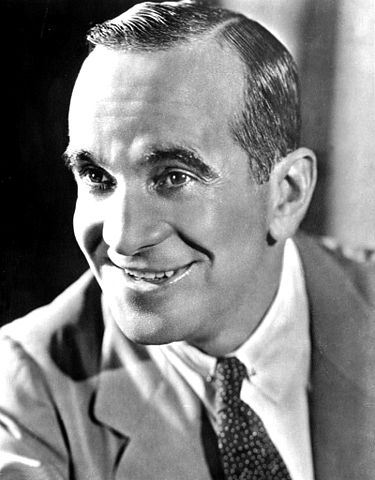Asa “Al Jolson” Yoelson (born in Seredzius, Lithuania on May 26, 1886 and died in San Francisco, California on October 23, 1950) was an acclaimed American singer and actor whose career lasted from 1911 until his death in 1950. He was one of the most popular entertainers of the 20th century whose influence extended to other popular performers, including Bing Crosby and Eddie Fisher.
Early life and Career
Jolson’s parents were Jewish immigrants, Moshe Reuben Yoelson and Naomi Etta Cantor – the original family name was Hesselson. His father was the Rabbi of the Talmud Torah Synagogue in Washington, D.C. Jolson became a popular singer in the New York City, beginning as early as 1898, when he and his brother entertained troops in the Spanish American War.
By 1911, he had parlayed a supporting appearance in the Broadway musical LA Belle Paree into a starring role. He began recording and was soon internationally famous for his extraordinary stage presence and personal rapport with audiences.
His Broadway career is unmatched for length and popularity, having spanned close to 30 years (1911-1940). Audiences shouted, pleaded, and often would not allow the show to proceed, such was the power of Jolson’s presence.
At one performance in Boston, the usual staid and conservative audience stopped the show for 45 minutes. He said to have an “electric” personality, along with ability to make each member of the audience believe that he was singing only to them. However, he is best known today for his appearance on one of the first “talkies”. The Jazz Singer, the first feature film with sound to enjoy wide commercial success, in 1927.
In The Jazz Singer, Jolson performed the song “Mammy” in blackface. In truth, Jolson’s singing was never jazz, indeed his style remained forever rooted in the vaudeville stage at the turn of the 20th century.
Singing with the Warner’s for a series of “speakies”, Jolson made The Singing Fool (1928) – another tearjerker, the story of a driven entertainer who insisted upon going on with the show even as his small son lay dying – and its signature tune, “Sonny Boy”, became the first American record to sell 3 million copies.
Among the many songs popularized by Jolson were “You Made Me Love You (I Didn”t Want to Do It)”, “Rock-a-bye Your Baby (With a Dixie Melody)”, “Swanee” (songwriter George Gershwin”s first success), “April Showers”, ””Toot, Toot, Tootsie, Goodbye”, “California, Here I Come”, “When the red, Red Robin Comes Bob-Bob-Bobbin” Along”, “Sonny Boy”, and “Avalon”.
Jolson was the first music artist to sell over 10 million records. While no official Billboard magazine chart existed during Jolson’s career, their staff archivist Joel Whiteburn used a variety used a variety of sources such as Talking Machines World’s list of top-selling recordings, and Billboard’s own sheet music and vaudeville charts to estimate the hits of 1890-1954. By this recording, Jolson had the equivalent of 23 No. 1 hits, the 4th highest total ever, trailing only Bing Crosby, Paul Whiteman, and Guy Lombardo. Whiteburn calculates that Jolson topped one chart or another for 114 weeks.
Jolson was a political and economic conservative, supporting Calvin Coolidge for president of the United States in 1924 (with the ditty “Keep Cool with Coolidge”), unlike most other Jews in the arts, who supported the losing Democratic candidate, John Williams Davis.
Jolson was married to actress/dance Ruby Keeler from 1928 to 1940, when they divorced. The couple had adopted a son, Al Jolson Jr., during their marriage, but when he was 14 the boy changed his name to Peter Lowe after his mother”s second husband, John Lowe.
After leaving the Broadway Stage, Jolson starred on radio, The Al Jolson Show aired 1933-1939, 1942-1943, and 1947-1949, and shows were typically rated in the top ten.
Death
While playing cards, Jolson collapsed and died of a massive heart attack on October 23, 1950. At the time of his death, he was staying at the St. Francis Hotel in San Francisco, Jolson was 64. He was interred in the Hillside Memorial Park Cemetery in Culver City, California, where a statue of Jolson beckons visitors to his crypt. On the day he died, Broadway lowered its lights for ten minute”s in Jolson honour.
A Jolson has three stars on the Hollywood Walk of Frame;
1. For his contribution to the motion picture industry at 6622 Hollywood Blvd.
2. For his contribution to the recording industry at 1716 Vine Street.
3. For his contribution to the radio industry at 6750 Hollywood Blvd.
Forty-four years after Jolson’s death, the United States Postal Service acknowledged his contribution by issuing a postage stamp in his honour. The 29-cent stamp was unveiled by Erle Jolson Krasna, Jolson”s fourth wife, at a ceremony in New York City’s Lincoln Center on September 1, 1994. This stamp was one of a series honouring popular American singers, which included Bing Crosby, Nat King Cole, Ethel Merman, and Ethel Waters. Al Jolson is one of Mr. Burns”(from the Simpsons) favourite actors – he believes that he his still alive.
Jolson’s song “I’m Sitting on Top of World” was played during the opening montage of 1930”s New York City in 2005 remake of King Kong.
In August 2006, Al Jolson had a street in New York named in his honour after nine years of trying by the international Al Jolson Society.
Useful Links
Al Jolson International Society.
Discover more from LandmarkLocation.com
Subscribe to get the latest posts sent to your email.


